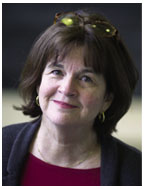
 Sara
McLanahan
Sara
McLanahan
Photo by FrankWojciechowski
Marriage is expected to be a focus in congressional debate over the reauthorization of welfare legislation this year, and Sara McLanahan’s research on “fragile families” will figure into that discussion. A professor of sociology and public affairs and director of the Bendheim-Thoman Center for Research on Child Wellbeing, McLanahan is helping to develop a program for the Bush administration that will offer new, unwed parents relationship-skills training, as well as education and job training. Here, she speaks with PAW’s Kathryn Federici Greenwood.
Can you speak about the last time this country took on welfare reform? What good and bad came out of reform legislation in 1996?
A lot of the money went into helping people get work and keep work. In the past, welfare had just been a cash payment. In 1996 there was a shift, not only in trying to push people into work, but also there was a shift in funding for all kinds of work-related services. So lots of money went into child care, for example.
At the time everyone thought that all these people were going to be thrown off welfare and into the streets and it would be bad for children, mothers, and families. But it’s been much more successful than liberals would have thought. It looks as if the bottom 10 percent of the caseload are worse off than they were before the reform, but most of the people are better off. There is very little evidence that welfare reform hurt children.
Why are you studying fragile families?
Because there was a big increase in nonmarital childbearing, and none of the data from studies on this population had any information on the fathers. It was kind of assumed that the father wasn’t even in the picture. And there were a lot of perceptions that these fathers had very casual relationships, that maybe the mother didn’t even know who the father was. So we felt that we needed to do a study that would start with the birth of the child. The main purpose was to find out what was the nature of the relationship of the parents from their point of view, and what were the characteristics of the father.
What have been your most striking findings?
Eighty-three percent of the parents are romantically involved. Seventy-three percent say their chances of marriage are 50—50 or better. There’s just a lot of affection and good intention. These are not people who are rejecting marriage. These are not casual relationships. In fact, it looks as if these people have enormous respect for marriage. So they had very high hopes.
Another important finding is that the birth of a child is a magic moment. At the time of the birth, parents are highly motivated to make a strong family and provide for their children. That was the good news.
The bad news was that the parents had very low capacities: 37 percent of mothers and 34 percent of fathers didn’t have a high school diploma; another 32 percent of mothers and 42 percent of fathers had only a high school diploma. So they were very disadvantaged. Getting married and having a stable marriage was going to be difficult.
What myths about unwed parents are dispelled by your study?
That the dads are not involved, that the mother doesn’t know the dad, that the dads don’t care about the children. Not only do fathers want to be involved, but these couples are actually couples, and half of them are living together in a marriage-like way.
How have your research findings and policy recommendations been received by the feminist community and by conservatives?
The conservatives love the idea that these couples are together and want to get married. They think that’s great. The moderate democrats are very supportive and like the idea of using marriage as the goal to make other changes in policies for low-income families that do include the father.
On the far left, there are a couple of criticisms. One is that the money that is going to go toward promoting marriage is going to come out of the pocket of single mothers and children. That’s a concern. It’s not clear yet whether that’s going to happen. I think it’s important that those advocates lobby for the single mothers to make sure that all the money doesn’t get shifted to the new program.
And then there’s a smaller group of welfare advocates and feminists
who are worried that promoting marriage will promote violence in the family
because they have this belief that these men are really bad guys. ![]()
